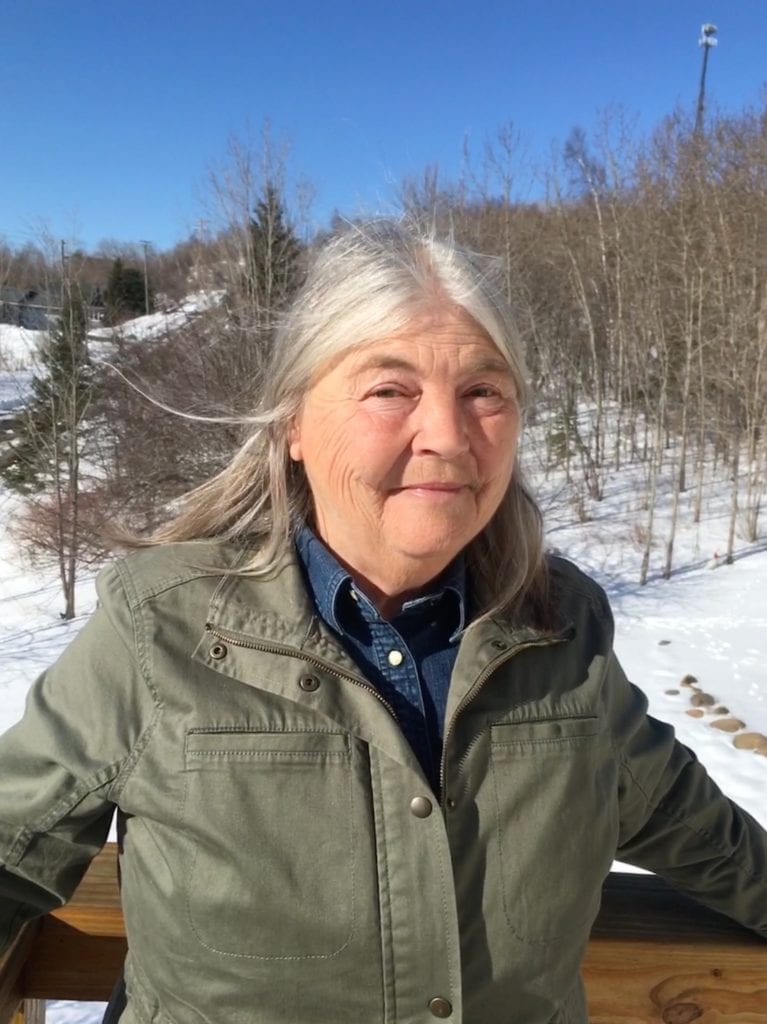
Each day leading up to the 2019 Minnesota Book Awards Ceremony, we’ll be featuring an exclusive interview with one of our 36 finalists. Learn more about these incredible local writers and gear up to see the winners announced live in person April 6.
Interview with Dianna Hunter, author of Wild Mares: My Lesbian Back-to-the-Land Life
Category: Memoir & Creative Nonfiction, sponsored by Bradshaw Celebration of Life Centers

How does it feel to be a Minnesota Book Award finalist?
I learned the news while sitting at my kitchen counter on a winter-vortex day in Duluth, browsing the Sunday Star Tribune. When I saw my book named, I wasn’t just surprised. I felt thunderstruck. A couple of friends called to congratulate me, and I couldn’t settle back down to read the rest of the paper until late afternoon. By then, excitement had given way to feeling honored, reinforced, and grateful. Being named a finalist means an acknowledgement of hard work, perseverance, and attention to craft.
Tell us something about your finalist book that you want readers to know.
Wild Mares, my memoir, tells the story of a working-class North Dakota girl who discovers feminism in 1970, comes out, and lives a lesbian-feminist back-to-the-land dream on a few shared farms. As the memoirist, of course, I am that idealistic and gritty girl. My ambitions, and those of the other young women who farmed with me, weren’t modest. We wanted to end the Vietnam War, heal the Earth, and overhaul the sex and gender norms of patriarchy. We fell short, but we made a start at building lesbian land communities. We also forged solid connections with some of our rural neighbors, and I bought and operated a dairy farm until the Reagan-era farm crisis introduced me to hard times and activist farmers who taught me to advocate for my neighbors and myself.
Let us know a little bit about your writing life. What brought you to a writing career and how did you become a published author?
Right after high school, I worked summers as a paid reporter for my hometown daily newspaper in Minot, North Dakota. After college in Saint Paul, I wrote for a lesbian-feminist journal, So’s Your Old Lady, before leaving the Twin Cities to go back to the land. Then I spent more than a decade farming and wrote only sporadically until after I lost my dairy farm in 1986. A few years later, Jim Perlman of Duluth’s Holy! Cow Press published Breaking Hard Ground: Stories of the Minnesota Farm Advocates, a book that I edited after collecting farmers’ and lawyers’ oral history stories with the help of another writer. Carol Bly wrote the foreword, and over a number of years she mentored me generously toward writing clear, direct prose that does not turn away from politics in the name of art.
Minnesota is often ranked highly as a state that values literature and reading. In your experience, what is it about our state that makes it such a welcoming place for writers and book creators?
For one thing, I find magic and grace in our winters, and I do most of my writing then. The long nights, the cold, and the luminescence of the snow help me to let time flow around me while I travel inward both psychologically and spiritually. I seem to need this inward space out of time to find out what I think and put it into words. Another factor is the Minnesota arts scene. From Grand Portage to Pipestone, we can find dance, theater, storytelling, visual arts, crafts, music, radio, film, reading groups, writing organizations, bookstores, libraries, publishers, and so on. My local writers’ organization, Lake Superior Writers, has sponsored several publications and events linking writers with other artists. The cross-pollination encourages us to get the work out of our heads and into the public sphere.
What is something you are good at that few people know about?
Few people know much about me at all, and even fewer know that I’m a gardener, gatherer, and creative cook who trusts her eyes, nose, palate, and experience. In the winter, I love to roast meat and veggies brushed with olive oil, garlic, and herbs that my spouse and I have preserved. Come summer, we enjoy fresh herbs, berries, and produce from our gardens, green spaces, and local co-ops and farmers’ markets. Our parents and grandparents grew, preserved, gathered, and enjoyed real food, and in that way we haven’t strayed far from their template.
What do you love about libraries?
Two things: books and librarians. Books speak for themselves. Librarians do, too, quite eloquently when called on, but they operate under the public’s radar most of the time. Librarians do more than almost anyone else to preserve freedom of thought, expression, and access to ideas in America. Public librarians accomplish this work under especially challenging circumstances. As one of my librarian friends told me, if we didn’t have public libraries now, we would be hard pressed to get them started. In this era of disinformation and zeal to privatize everything and cut resources for public projects, we need to actively love our libraries and support them however we can.
About Dianna Hunter
In Dianna Hunter’s earlier book and radio series, Breaking Hard Ground: Stories of the Minnesota Farm Advocates, activist farmers told their own stories of fighting to keep people on the land during the Reagan-era farm crisis. She herself was both a farmer and a farm advocate, having come to rural life through the series of lesbian collective farm experiments that she chronicles in Wild Mares. After the farm crisis, she earned an MA in creative writing from Iowa State University and taught writing and women’s and gender studies at four universities. Her short stories, poems, and nonfiction writing have been widely published, read aloud, posted online, and broadcast.

